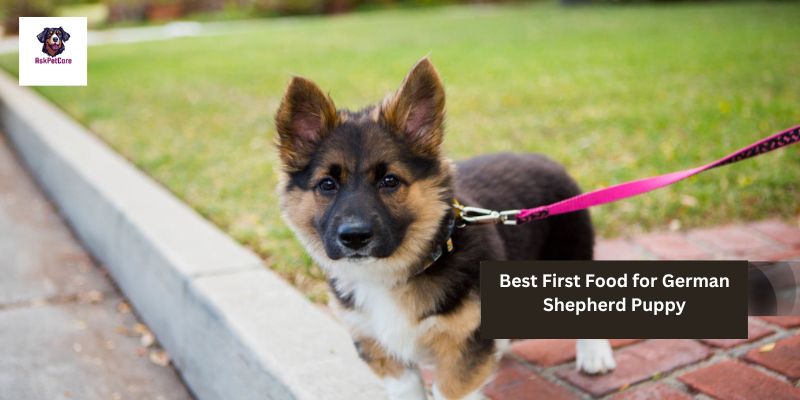Hello, shepherd lovers today I will explain in detail about Best First Food for your German Shepherd Puppy.
Welcome, fellow pet parents, to our guide on choosing the best food for your German Shepherd puppy as they transition from weaning to their first solid meals. Bringing home a new puppy is an exciting time, filled with joy and anticipation as we welcome our furry friends into our homes and hearts. As responsible pet owners, one of the most important decisions we can make for our puppies is selecting the right food to support their growth and development during this crucial stage of life.
The initial feeding after weaning is a significant milestone in your German Shepherd puppy’s journey towards adulthood. It’s a time when their nutritional needs are rapidly evolving, and the food you choose plays a vital role in shaping their health and well-being for years to come. In this blog post, we’ll delve into the importance of selecting the right food for your German Shepherd puppy, discuss key considerations when choosing puppy food, recommend some top picks for their first meals, and provide guidance on transitioning them to their new diet. So, grab a cup of tea, snuggle up with your pup, and let’s explore the wonderful world of puppy nutrition together.

Hello everyone who loves dogs! I’m Dr. Arif Aziz, and I’ve been taking care of pets especially dogs at my clinic for a long time, exactly 14 years! I’m here to share some valuable information with you that I’ve gathered from books during my study time written by experts in veterinary medicine (DVM) and MSC (Master of Science), as well as from my own experiences working with dogs.
Firstly Understand Your German Shepherd Puppy’s Nutritional Needs:
Nutrition plays a crucial role in the growth and development of your German Shepherd puppy during their early stages of life. Just like human babies, puppies rely on a balanced diet to support their rapid growth, strong bones, and overall health. Providing proper nutrition from the start sets the foundation for a healthy and happy life for your furry companion.
Key nutrients are essential for your German Shepherd puppy’s healthy development. These include protein, which is necessary for building strong muscles and tissues, as well as fat, which provides energy and supports proper brain development. Carbohydrates are another important nutrient source, supplying energy to fuel your puppy’s active lifestyle. Additionally, vitamins and minerals play vital roles in various bodily functions, including immune system support, bone health, and vision. Ensuring your puppy receives adequate amounts of these nutrients is essential for their overall well-being.
German Shepherd puppies have specific nutritional requirements that differ from other breeds due to their large size and active nature. They require a diet rich in high-quality proteins, such as meat or fish, to support their muscle development. Additionally, they benefit from foods containing omega-3 and omega-6 fatty acids, which contribute to healthy skin and coat. Because they are prone to joint issues as they age, providing supplements like glucosamine and chondroitin can help support their joint health from an early age. By understanding and meeting these specific nutritional needs, you can help ensure that your German Shepherd puppy grows into a strong, healthy, and vibrant adult dog.

Considerations When Choosing Puppy Food:
When selecting the best food for your German Shepherd puppy, it’s important to consider several factors to ensure their nutritional needs are met. Firstly, take into account their age, as puppies have different dietary requirements than adult dogs. Look for puppy-specific formulas that provide the right balance of nutrients to support their growth and development. Secondly, consider your puppy’s size and breed, as larger breeds like German Shepherds may have different nutritional needs compared to smaller breeds. Opt for a food formulated specifically for large breed puppies to ensure they receive the appropriate nutrients in the right proportions.
Another important consideration is your puppy’s activity level. Active puppies may require more calories to fuel their energy levels, so choose a food that provides adequate energy without excess fat or calories. Additionally, take note of any specific dietary needs or health concerns your puppy may have. For example, if your puppy has allergies or sensitivities, opt for a food with limited ingredients or novel protein sources to avoid triggering adverse reactions.
When it comes to the type of food, there are several options to choose from, including dry kibble, wet food, and raw or homemade diets. Dry kibble is convenient, affordable, and helps promote dental health by reducing tartar buildup. Wet food can be more palatable for picky eaters and provides additional moisture to support hydration. Raw or homemade diets offer the flexibility to control ingredients and tailor meals to your puppy’s specific needs but require careful planning to ensure they are balanced and nutritionally complete.
Regardless of the type of food you choose, prioritize quality by selecting a high-quality puppy food formulated for large breeds like German Shepherds. Look for foods made with real meat as the first ingredient, free from artificial additives, fillers, and by-products. Choosing a reputable brand with a history of producing nutritious and balanced diets can help ensure your puppy receives the essential nutrients they needs to thrive. By considering these factors and choosing a high-quality food tailored to your German Shepherd puppy’s needs, you can lay the foundation for a lifetime of health and happiness.

Now explore Recommended First Foods for German Shepherd Puppies:
When it comes to feeding your German Shepherd puppy, choosing high-quality food with balanced nutrition is essential for their growth and development. Here are some recommended puppy foods that are suitable for German Shepherd puppies:
- Dry Kibble Options:
- Royal Canin German Shepherd Puppy Dry Dog Food: Formulated specifically for German Shepherd puppies, this dry kibble contains precise levels of protein, fat, and carbohydrates to support their unique nutritional needs. It also includes ingredients to support digestive health and joint health, which are important for large-breed puppies.
- Eukanuba Large Breed Puppy Dry Dog Food: Designed for large breed puppies, including German Shepherds, this dry kibble provides essential nutrients for healthy growth and development. It contains high-quality animal proteins and DHA to support brain development and cognitive function.
- Wet Food Options:
- Hill’s Science Diet Puppy Large Breed Wet Dog Food: This wet food is specially formulated for large breed puppies and provides a balanced mix of nutrients for optimal growth and development. It features real chicken as the first ingredient and is easy to digest, making it suitable for young puppies.
- Blue Buffalo Wilderness Puppy Grain-Free Canned Dog Food: Grain-free and made with real meat, this wet food option is packed with protein to support your German Shepherd puppy’s muscle development. It also contains omega fatty acids for healthy skin and coat.
When choosing a puppy food for your German Shepherd, look for brands or products known for their suitability for large breed puppies. These foods are typically formulated with controlled levels of calcium and phosphorus to support bone health and growth rate control. Additionally, opt for foods made with high-quality ingredients and free from artificial additives, fillers, and by-products. Remember to transition your puppy to their new food gradually to prevent digestive upset, and monitor their response to ensure they thrive on their chosen diet.

Transitioning Your Puppy to Their New Diet:
Transitioning your German Shepherd puppy to a new food should be done gradually to prevent digestive upset and ensure a smooth transition. Here’s how to do it:
- Gradual Transition: Start by mixing a small amount of the new food with your puppy’s current food. Begin with a ratio of 75% old food to 25% new food for a few days. Then, gradually increase the proportion of the new food while decreasing the old food over about a week or longer, until your puppy is eating only the new food.
- Monitor Your Puppy’s Response: Pay close attention to how your puppy responds to the new diet during the transition period. Watch for signs of digestive upset such as diarrhea, vomiting, or changes in appetite. If you notice any negative reactions, slow down the transition process or revert to the previous food and consult with your veterinarian if necessary.
- Adjust as Needed: Every puppy is different, so be prepared to adjust the transition timeline based on your puppy’s individual needs and response. Some puppies may transition smoothly with no issues, while others may require a slower transition or a different approach. Listen to your puppy’s cues and adjust accordingly to ensure they are comfortable and happy with their new diet.
- Provide Fresh Water: Alongside their new food, always ensure that your puppy has access to fresh, clean water at all times. Proper hydration is essential for your puppy’s overall health and well-being, especially during the transition period when their digestive system may be adjusting to the new food.
By following these steps and closely monitoring your German Shepherd puppy’s response, you can help ensure a successful transition to their new diet without any digestive upset. Remember to be patient and gradual with the process, and prioritize your puppy’s health and well-being every step of the way.

Additional Tips for Feeding Your German Shepherd Puppy:
Feeding your German Shepherd puppy the right amount of food at the right times is essential for their health and well-being. Here are some general feeding guidelines to follow:
- Portion Sizes and Feeding Frequency: Puppies grow rapidly and have high energy needs, so it’s important to feed them a balanced diet in appropriate portion sizes. For German Shepherd puppies, feeding amounts can vary based on age, weight, activity level, and individual metabolism. As a general rule, divide their daily recommended amount of food into several smaller meals throughout the day to support digestion and prevent overeating. Aim for three to four meals a day for younger puppies and gradually transition to two meals a day as they get older.
- Establishing a Regular Feeding Schedule: Consistency is key when it comes to feeding your puppy. Establish a regular feeding schedule and stick to it as closely as possible. Feeding your puppy at the same times each day helps regulate their metabolism and digestive system. Avoid free-feeding or leaving food out all day, as this can lead to overeating and weight gain. Instead, offer measured portions of food at designated meal times and remove any uneaten food after 15-20 minutes.
- Addressing Common Feeding Concerns: Keep an eye out for signs of food allergies or sensitivities, such as itching, digestive upset, or changes in behavior. If you suspect your puppy has a food allergy or sensitivity, consult with your veterinarian for guidance on identifying and managing the issue. Additionally, if your puppy experiences persistent vomiting, diarrhea, lethargy, or other concerning symptoms, seek veterinary care promptly, as these could be signs of a more serious health problem.
By following these tips and guidelines, you can ensure that your German Shepherd puppy receives the proper nutrition and feeding routine to support their growth and development. Remember to monitor your puppy’s weight and body condition regularly and adjust their feeding plan as needed to maintain their optimal health and well-being.
Homemade Food For German Shepherd Puppy.
Preparing homemade food for your German Shepherd puppy can be a rewarding way to provide them with nutritious and balanced meals. Here’s how to create homemade food for your puppy in simple steps:
- Consult with Your Veterinarian: Before starting a homemade diet for your German Shepherd puppy, it’s important to consult with your veterinarian to ensure that you’re meeting all of their nutritional needs. Your vet can guide the proper balance of protein, carbohydrates, fats, vitamins, and minerals necessary for your puppy’s growth and development.
- Choose High-Quality Ingredients: Select high-quality, fresh ingredients for your puppy’s homemade meals. Lean proteins such as chicken, turkey, beef, or fish can serve as the primary protein source. Include carbohydrates like brown rice, sweet potatoes, or whole grains for energy, and add a variety of vegetables such as carrots, peas, and spinach for essential vitamins and minerals.
- Cook Thoroughly: Cook all ingredients thoroughly to ensure they are safe for your puppy to eat. Avoid using seasonings, spices, or additives that may be harmful to dogs. Boiling, steaming, or baking are healthy cooking methods that help retain nutrients while eliminating the risk of harmful bacteria.
- Balancing Nutrients: Aim to achieve a balanced ratio of protein, carbohydrates, and fats in your puppy’s homemade meals. Protein should make up around 25-30% of the meal, while carbohydrates should account for about 50% and fats for 20-25%. Including a variety of ingredients ensures your puppy receives a diverse range of nutrients.
- Portion Control: Be mindful of portion sizes to prevent overfeeding or underfeeding. Your veterinarian can provide recommendations on the appropriate portion sizes based on your puppy’s age, weight, and activity level. Divide their daily food intake into several smaller meals throughout the day to aid digestion and prevent bloating.
- Gradual Transition: If transitioning your puppy to a homemade diet from commercial dog food, do so gradually over the course of about a week to avoid digestive upset. Mix increasing amounts of homemade food with their current food until they are fully transitioned to the new diet.
- Monitor Your Puppy’s Health: Keep an eye on your puppy’s overall health, energy levels, coat condition, and stool quality when feeding them homemade food. If you notice any changes or concerns, consult with your veterinarian for further guidance.
Homemade food for your German Shepherd puppy can offer a fresh and wholesome alternative to commercial dog food, but it’s essential to ensure that it meets all of their nutritional needs. With proper planning, preparation, and guidance from your veterinarian, you can provide your puppy with delicious and nutritious homemade meals that support their health and well-being.

Vet-Recommended Dog Food For German Shepherd Puppy.
Choosing the right dog food for your German Shepherd puppy is crucial for their growth and development. Here’s a breakdown of vet-recommended dog food options:
- Royal Canin German Shepherd Puppy Dry Dog Food: This specially formulated dry dog food is tailored to meet the unique nutritional needs of German Shepherd puppies. It contains a precise blend of proteins, fats, carbohydrates, vitamins, and minerals to support their growth and development. Plus, it includes ingredients to promote digestive health and joint support, which are essential for large breed puppies like German Shepherds.
- Eukanuba Large Breed Puppy Dry Dog Food: Another vet-recommended option, this dry dog food is designed specifically for large breed puppies, including German Shepherds. It provides essential nutrients such as protein, calcium, and DHA to support healthy bone and brain development. The balanced formula helps puppies maintain an ideal body condition and supports their overall health and well-being.
- Hill’s Science Diet Puppy Large Breed Dry Dog Food: This dry dog food is formulated for large breed puppies, offering a precise balance of nutrients to support their growth and development. It contains high-quality ingredients such as real chicken as the first ingredient and provides essential vitamins, minerals, and antioxidants to promote a strong immune system and healthy skin and coat.
- Blue Buffalo Wilderness Puppy Grain-Free Dry Dog Food: For pet owners seeking a grain-free option, this dry dog food is a vet-recommended choice for German Shepherd puppies. It features real chicken as the main protein source and is free from artificial additives, fillers, and by-products. The grain-free formula is suitable for puppies with sensitivities or allergies and provides a balanced diet to support their overall health and vitality.
When choosing a vet-recommended dog food for your German Shepherd puppy, look for options that are formulated specifically for large breed puppies and meet the nutritional standards set by organizations like the Association of American Feed Control Officials (AAFCO). These foods are designed to provide the essential nutrients your puppy needs for healthy growth and development. Remember to consult with your veterinarian for personalized recommendations based on your puppy’s age, weight, activity level, and any specific dietary needs or health concerns.
Best First Food For your German Shepherd Puppy In India.
Best Dry Food For German Shepherd Puppy.
Selecting the best first food for your German Shepherd puppy in India is essential for their growth and development. Here’s a breakdown of some recommended options:
- Royal Canin German Shepherd Puppy Dry Dog Food: This specially formulated dry dog food is tailored to meet the unique nutritional needs of German Shepherd puppies. It contains a precise blend of proteins, fats, carbohydrates, vitamins, and minerals to support their growth and development. Plus, it includes ingredients to promote digestive health and joint support, which are essential for large-breed puppies like German Shepherds. Royal Canin is widely available in India and is trusted by veterinarians for its quality and effectiveness.
- Pedigree Pro Puppy Large Breed Dry Dog Food: Pedigree Pro offers a range of puppy food options suitable for large breed puppies like German Shepherds. Their large breed formula provides balanced nutrition with essential nutrients such as protein, calcium, and DHA to support healthy bone and brain development. Pedigree Pro is a popular choice among pet owners in India and is readily available in pet stores and online platforms.
- Drools Focus Puppy Large Breed Dry Dog Food: Drools is a leading pet food brand in India, offering a variety of options for puppies, including large breed formulas. Their Focus Puppy Large Breed Dry Dog Food provides complete and balanced nutrition for German Shepherd puppies, with high-quality ingredients to support their growth and vitality. Drools is known for its affordability and availability across various retail outlets in India.
When choosing the best first food for your German Shepherd puppy in India, consider options that are specifically formulated for large breed puppies and meet the nutritional standards set by regulatory authorities. These foods should provide essential nutrients such as protein, fats, carbohydrates, vitamins, and minerals to support your puppy’s overall health and development. It’s also important to consult with your veterinarian for personalized recommendations based on your puppy’s age, weight, activity level, and any specific dietary needs or health concerns. By selecting a high-quality puppy food and feeding it according to the manufacturer’s guidelines, you can ensure that your German Shepherd puppy receives the nutrition they need to thrive.

How Much To Feed A German Shepherd Puppy By Weight:
Feeding your German Shepherd puppy the right amount of food based on their weight is crucial for their health and well-being. Here’s a detailed explanation of how much to feed a German Shepherd puppy based on their weight:
- Weigh Your Puppy: Start by weighing your German Shepherd puppy using a scale. This will give you an accurate starting point to determine their daily food requirements.
- Check Feeding Guidelines: Most commercial dog foods provide feeding guidelines on the packaging based on your puppy’s weight and age. These guidelines typically recommend a certain amount of food per day, divided into multiple meals.
- Consider Age and Growth Stage: German Shepherd puppies go through rapid growth phases, especially during their first year of life. As a general rule, younger puppies require more calories to support their growth and development, while older puppies may need slightly less food as they approach adulthood.
- Calculate Daily Food Amount: Use the feeding guidelines provided by the dog food manufacturer as a starting point. Typically, German Shepherd puppies require about 2-3% of their body weight in food per day. For example, if your puppy weighs 20 pounds, they would need approximately 0.4 to 0.6 pounds of food per day.
- Divide into Meals: Divide the total daily food amount into several smaller meals throughout the day. This helps prevent overeating, aids digestion, and provides a steady source of energy for your puppy.
- Monitor Your Puppy’s Condition: Keep an eye on your puppy’s body condition, energy levels, and growth rate. Adjust their food intake accordingly based on their individual needs. If your puppy is gaining weight too quickly or becoming overweight, you may need to reduce their food intake slightly. Conversely, if they are not gaining weight or seem underweight, you may need to increase their food intake.
- Consult with Your Veterinarian: It’s always a good idea to consult with your veterinarian for personalized feeding recommendations based on your puppy’s age, weight, activity level, and overall health. Your vet can provide guidance on the best diet for your puppy’s specific needs and monitor their growth and development over time.
By following these guidelines and adjusting your puppy’s food intake as needed, you can ensure that they receive the appropriate amount of nutrition to support their growth and development into a healthy adult German Shepherd.
Best Time To Feed German Shepherd Puppy.
Feeding your German Shepherd puppy at the right times is essential for their health and well-being. Here’s a detailed explanation of the best time to feed a German Shepherd puppy:
- Establish a Feeding Schedule: It’s important to establish a consistent feeding schedule for your German Shepherd puppy. Feeding them at the same times each day helps regulate their metabolism, digestive system, and energy levels.
- Divide Meals Throughout the Day: German Shepherd puppies have small stomachs and high energy needs, so it’s best to divide their daily food intake into multiple meals. For younger puppies, aim for three to four meals spaced throughout the day. As they get older, you can gradually transition to two meals a day.
- Morning Meal: Many pet owners choose to feed their German Shepherd puppy their first meal in the morning shortly after waking up. This helps kickstart their metabolism and provides them with the energy they need to start their day.
- Midday Meal: If possible, offering a midday meal around lunchtime can help sustain your puppy’s energy levels and prevent hunger between breakfast and dinner. This meal can be smaller than the morning and evening meals.
- Evening Meal: The last meal of the day should be served in the early evening, ideally a few hours before bedtime. This gives your puppy enough time to digest their food before settling down for the night.
- Avoid Late-Night Feedings: It’s generally best to avoid feeding your German Shepherd puppy late at night or right before bedtime. Feeding them too close to bedtime can lead to digestive upset or discomfort during the night.
- Monitor Their Response: Pay attention to how your puppy responds to their feeding schedule. Some puppies may do better with slightly larger or smaller meals or different meal timing. Adjust their feeding schedule as needed based on their individual needs and preferences.
- Consult with Your Veterinarian: If you’re unsure about the best feeding schedule for your German Shepherd puppy, or if you have any concerns about their growth or health, don’t hesitate to consult with your veterinarian. They can provide personalized recommendations based on your puppy’s age, weight, activity level, and overall health.
By following these guidelines and establishing a consistent feeding schedule, you can ensure that your German Shepherd puppy receives the nutrition they need to grow and thrive into a healthy adult dog.
German Shepherd Puppy Feed Chart.
Feeding your German Shepherd puppy according to a feed chart can help ensure they receive the right amount of nutrition at each stage of their development. Here’s a detailed explanation of a German Shepherd puppy feed chart:
- Birth to 4 Weeks (Neonatal Stage): During the first four weeks of life, German Shepherd puppies rely entirely on their mother’s milk for nutrition. The mother’s milk provides essential antibodies and nutrients necessary for their growth and immune system development. It’s crucial to ensure the mother receives a balanced diet during this time to produce quality milk for her puppies.
- 4 to 8 Weeks (Transition Stage): At around four weeks of age, German Shepherd puppies start transitioning from solely nursing to consuming solid food. Begin introducing moistened puppy food or puppy milk replacers to encourage them to eat. Gradually increase the amount of solid food offered and decrease the amount of milk replacer or water used to moisten the food. By the end of this stage, puppies should be fully weaned and eating solid puppy food.
- 2 to 4 Months (Rapid Growth Phase): During this phase, German Shepherd puppies experience significant growth and development. Feed them a high-quality puppy food specifically formulated for large-breed puppies. Offer three to four small meals per day to meet their increased energy needs. Monitor their body condition and adjust portion sizes as needed to ensure they maintain a healthy weight.
- 4 to 9 Months (Continued Growth and Exploration): Puppies continue to grow during this stage but at a slower rate compared to earlier months. Reduce feeding frequency to two to three meals per day, focusing on providing balanced nutrition to support their growth and development. Watch for signs of behavioral changes and challenges commonly seen during adolescence, such as increased independence and exploration.
- 9 to 12 Months (Final Growth Phase): By nine months of age, German Shepherd puppies are nearing adulthood and physical maturity. Continue feeding them high-quality puppy food formulated for large-breed puppies. Offer two meals per day and monitor their body condition closely to ensure they are maintaining a healthy weight. Provide plenty of opportunities for exercise and mental stimulation to keep them engaged and healthy.
- 12 to 18 Months (Transition to Adulthood): At around 12 months of age, German Shepherd puppies typically reach their full adult size and are ready to transition to adult dog food. Gradually transition them to their new diet over the course of about a week to avoid digestive upset. Continue providing regular meals twice a day and monitor their overall health and well-being.
Throughout each stage of your German Shepherd puppy’s growth and development, it’s important to provide them with a balanced diet, plenty of fresh water, and regular veterinary care. Consult with your veterinarian for personalized feeding recommendations based on your puppy’s age, weight, activity level, and any specific dietary needs or health concerns. By following a German Shepherd puppy feed chart and providing them with proper nutrition, you can help ensure they grow into a healthy and happy adult dog.
A simple table outlining the feeding guidelines for German Shepherd puppies at different stages of development:
| Stage | Age Range | Feeding Guidelines |
| Neonatal Stage | Birth to 4 weeks | – Puppies rely on their mother’s milk for nutrition. |
| – Ensure the mother receives a balanced diet. | ||
| Transition Stage | 4 to 8 weeks | – Introduce solid food gradually. |
| – Start with moistened puppy food or milk replacer. | ||
| Rapid Growth Phase | 2 to 4 months | – Feed high-quality puppy food for large breeds. |
| – Offer 3-4 small meals per day. | ||
| Continued Growth | 4 to 9 months | – Reduce feeding frequency to 2-3 meals per day. |
| and Exploration | – Monitor body condition and adjust portion sizes. | |
| Final Growth Phase | 9 to 12 months | – Near adulthood, continue with balanced puppy food. |
| – Provide 2 meals per day, watch for healthy weight. | ||
| Transition to Adulthood | 12 to 18 months | – Transition to adult dog food gradually. |
| – Continue regular feeding schedule, and monitor health. |
These guidelines outline the progression of feeding practices for German Shepherd puppies as they grow and develop. It’s essential to provide them with balanced nutrition, monitor their body condition, and consult with a veterinarian for personalized recommendations.
I hope you will thoroughly understand the Best First Food for German Shepherd puppies. Still, any quarry contacts me.
Here are some reference books that are considered authoritative on the topic of dog care, including nail care:
- “The Complete Dog Owner’s Manual” by Dr. Bruce Fogle
- “The Ultimate Guide to Dog Care: Everything You Need to Know to Keep Your Dog Happy and Healthy” by Amy Marder and Andrew Luescher
- “The Veterinarians’ Guide to Natural Remedies for Dogs: Safe and Effective Alternative Treatments and Healing Techniques from the Nations Top by Martin Zucker
